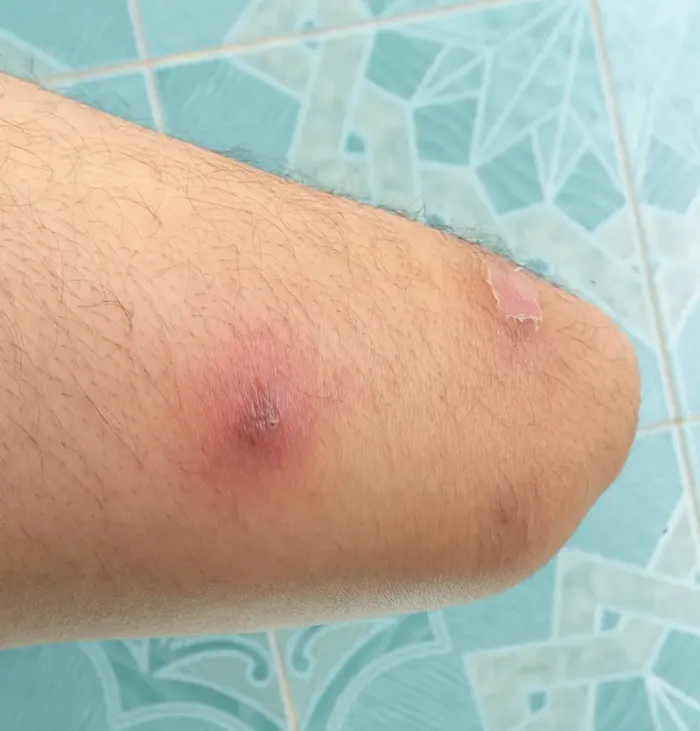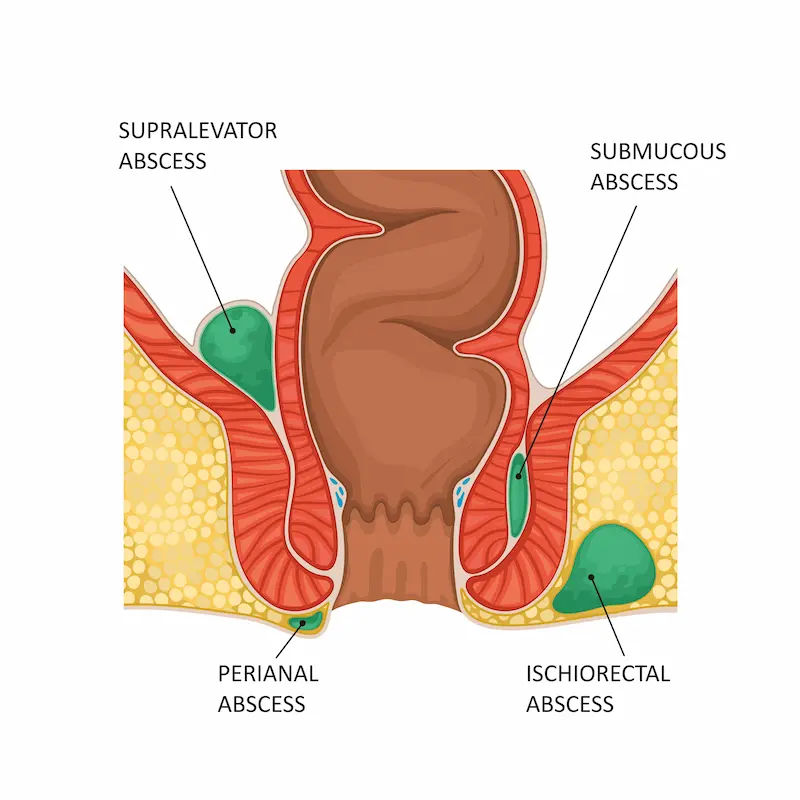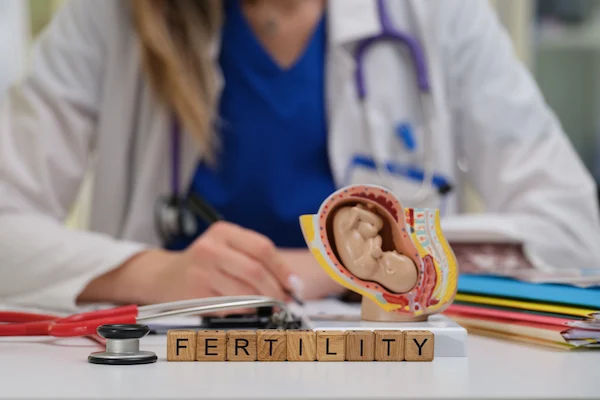Abscess Symptoms, Causes, Treatment, and Types
Know about the abscess, what it is, types, symptoms, prevention and treatment options.

Written by Dr. J T Hema Pratima
Reviewed by Dr. D Bhanu Prakash MBBS, AFIH, Advanced certificate in critical care medicine, Fellowship in critical care medicine
Last updated on 29th Aug, 2025

Introduction
An abscess is a painful collection of pus that forms under the skin or inside the body due to an infection. While it can be uncomfortable, the good news is that abscesses are treatable, and with the right care, you can recover fully.
In this article, we’ll break down everything you need to know about abscesses, what they are, their symptoms, causes, treatment options, and types, so you can recognise them early and take the right steps toward healing.
What Is an Abscess?
An abscess is a pocket of pus caused by a bacterial infection. When harmful bacteria enter the body, the immune system fights back by sending white blood cells to the infected area. This battle between bacteria and white blood cells leads to the formation of pus—a thick, yellowish fluid made up of dead cells, bacteria, and tissue debris.
Abscesses can develop anywhere in the body, including:
• Skin (boils, carbuncles)
• Teeth (dental abscess)
• Internal organs (liver, brain, lungs)
• Groin or armpit (hidradenitis suppurativa)
Consult a Surgeon for Personalised Advice
Common Symptoms of an Abscess
The symptoms of an abscess depend on its location, but some common signs include:
• Pain and tenderness – The area around the abscess is usually sore and painful to touch. Swelling and redness – The skin over the abscess may appear red, warm, and swollen.
• Pus-filled bump – A visible lump with white or yellow pus inside.
• Fever and chills – If the infection spreads, you may develop a fever.
• Fatigue – Feeling unusually tired due to the body fighting an infection.
• Internal abscesses (inside organs) may cause additional symptoms like:
1. Nausea
2. Unexplained weight loss
3. Pain in the affected organ
If you notice any of these symptoms, it’s important to seek medical attention to prevent complications.
What Causes an Abscess?
Abscesses are primarily caused by bacterial infections, most commonly Staphylococcus aureus (including MRSA). Other causes include:
• Blocked sweat or oil glands – leading to skin abscesses (boils).
• Poor dental hygiene – Causing tooth abscesses.
• Weakened immune system – People with diabetes, HIV, or those undergoing chemotherapy are at higher risk.
• Ingrown hairs or minor cuts – Bacteria can enter through small wounds.
• Chronic conditions – Like hidradenitis suppurativa (recurring abscesses in sweat glands).
Types of Abscesses
Abscesses can form in different parts of the body, and each type requires specific treatment.
1. Skin Abscess (Boil or Furuncle)
• Forms under the skin, often in hair follicles.
• Common in areas like the armpits, groin, or buttocks.
2. Dental Abscess
• Occurs due to tooth decay or gum infection.
• Causes severe tooth pain, swelling, and bad breath.
3. Internal Abscess
• Develops inside organs like the liver, brain, or appendix.
• May require imaging tests (ultrasound, CT scan) for diagnosis.
4. Pilonidal Abscess
• Forms near the tailbone due to ingrown hairs.
• Common in people who sit for long periods.
5. Peritonsillar Abscess (Quinsy)
• A complication of tonsillitis, causing throat pain and difficulty swallowing.
How Is an Abscess Treated?
Treatment depends on the abscess size and location.
1. Small Abscess (Home Care)
• Warm compress – Applying a warm, damp cloth can help drain pus naturally.
• Keep it clean – Wash with mild soap and water, then cover with a bandage.
• Avoid squeezing – Popping it yourself can spread infection.
2. Medical Treatment
• Incision and drainage (I&D) – A doctor makes a small cut to drain the pus.
• Antibiotics – Prescribed if the infection is severe or spreading.
• Pain relief – Over-the-counter painkillers like ibuprofen can help.
3. Serious Cases (Hospital Care)
• Surgery – Needed for deep or internal abscesses.
• IV antibiotics – For severe infections.
Preventing Abscesses
You can reduce the risk of abscesses by:
• Maintaining good hygiene – Wash hands regularly and keep wounds clean.
• Avoiding sharing personal items – Like razors or towels.
• Managing chronic conditions – Keep diabetes under control.
• Eating a balanced diet – Boosts immunity.
• Regular dental check-ups – Prevent tooth abscesses.
When to See a Doctor?
Seek immediate medical help if:
• The abscess is large, painful, or growing.
• You have a fever or chills.
• The redness spreads beyond the abscess.
• You have diabetes or a weakened immune system.
If you suspect an abscess, don’t wait; early treatment prevents complications.
Final Thoughts
The abscess is characterised by pus-filled lumps which can occur in the armpits, skin and teeth. The symptoms include pain, fever, chills and pus. It can be treated at home or hospital, based on the severity, with the use of medicines. Consult your doctor whenever needed and for advice.
Consult a Surgeon for Personalised Advice
Consult a Surgeon for Personalised Advice

Dr. Swathi Reddy Perugu
General Physician/ Internal Medicine Specialist
7 Years • MBBS, MD (General Medicine)
Hyderabad
Health plus, Hyderabad

Dr. Rajib Ghose
General Practitioner
25 Years • MBBS
East Midnapore
VIVEKANANDA SEBA SADAN, East Midnapore

Dr. Mohamed Azeem
General Physician/ Internal Medicine Specialist
2 Years • MBBS,MD(Internal Medicine) CCEBDM
Karaikudi
Apollo Hospitals Karaikudi, Karaikudi

Dr. Aakash Garg
Gastroenterology/gi Medicine Specialist
12 Years • MBBS, DNB (Medicine), DrNB (Gastroentrology).
Bilaspur
Apollo Hospitals Seepat Road, Bilaspur
(125+ Patients)

Dr. Khoushik K H
General Physician/ Internal Medicine Specialist
7 Years • MBB, MD
Bengaluru
Apollo Clinic Mahadevapura, Bengaluru
Consult a Surgeon for Personalised Advice

Dr. Swathi Reddy Perugu
General Physician/ Internal Medicine Specialist
7 Years • MBBS, MD (General Medicine)
Hyderabad
Health plus, Hyderabad

Dr. Rajib Ghose
General Practitioner
25 Years • MBBS
East Midnapore
VIVEKANANDA SEBA SADAN, East Midnapore

Dr. Mohamed Azeem
General Physician/ Internal Medicine Specialist
2 Years • MBBS,MD(Internal Medicine) CCEBDM
Karaikudi
Apollo Hospitals Karaikudi, Karaikudi

Dr. Aakash Garg
Gastroenterology/gi Medicine Specialist
12 Years • MBBS, DNB (Medicine), DrNB (Gastroentrology).
Bilaspur
Apollo Hospitals Seepat Road, Bilaspur
(125+ Patients)

Dr. Khoushik K H
General Physician/ Internal Medicine Specialist
7 Years • MBB, MD
Bengaluru
Apollo Clinic Mahadevapura, Bengaluru



